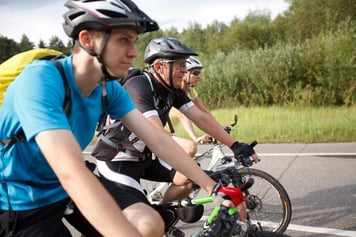As the weather warms up, bicyclists multiply on New Jersey roads. Some communities, like Basking Ridge, have booming recreational cycling clubs. Others see an increase in bicycle commuting during the months of longer daylight and less precipitation.
New Jersey has one of the highest population densities in the United States, and its population commutes mostly via car. Bike lanes and other cyclist-friendly road improvements aren’t as prevalent as in other Northeast states, where bike commuting rates are higher. Safety concerns can deter riders. Whether you bike for recreation or as part of your daily commute, there are some things you can do to make biking safer and more fun.
Use Alternate Routes Where Possible
There are several bicycle paths and trails in the region that minimize or eliminate interactions with automobile traffic. The New Jersey Department of Transportation (NJDOT) has published a map that details these corridors and outlines suggested recreational riding tours. One of these, the East Coast Greenway, extends for 78 miles across New Jersey from Pennsylvania through Trenton, New Brunswick, Princeton, Newark, and Jersey City. These alternate paths can be incorporated into a safe daily commuting plan as well.
Travel in Numbers
 Recreational cycling clubs across New Jersey gather regularly to bike in groups. These clubs allow cyclists of all ages and abilities to take advantage of the safety that traveling together provides. And commuter groups have also sprung up, like the Ridgewood Commuter Group, which meets at the same spot every morning to ride the 25 miles into Manhattan together. If it’s not possible to choose car-free routes, traveling in numbers can provide better visibility to cars as well as resources in the cases of accident or emergency.
Recreational cycling clubs across New Jersey gather regularly to bike in groups. These clubs allow cyclists of all ages and abilities to take advantage of the safety that traveling together provides. And commuter groups have also sprung up, like the Ridgewood Commuter Group, which meets at the same spot every morning to ride the 25 miles into Manhattan together. If it’s not possible to choose car-free routes, traveling in numbers can provide better visibility to cars as well as resources in the cases of accident or emergency.
Use Community Resources
Many bicyclists also write blogs dedicated to routes, safety, and empowering New Jersey bicyclists. “The Towpath Guy” writes a blog providing tips for accessing, riding, and commuting along the 30-mile long Main Canal that runs from Trenton to New Brunswick. Over 100 New Jersey communities have adopted "Complete Streets" policies to encourage safe roadways for all users, and activists across the state are working to create awareness of bicycle issues.
Follow Laws and Safety Recommendations
In New Jersey, bicyclists have many of the same rights and responsibilities as other vehicle operators. They have an equal right to be on the road and are required to obey most of the same traffic laws, including stopping and yielding. Cyclists on New Jersey roadways are required to wear or have certain equipment:
- Lights are required if operating a bicycle after dusk or before dawn. Riders must have a strong white front headlamp and a red rear lamp.
- Brakes on bicycles are required and must be powerful enough to make the wheels skid while stopping on dry, level, clean pavement.
- A bell or horn is also required to alert others to your approach.
- Helmets are strongly recommended to prevent or reduce the severity of head injuries in a crash, although they are only required for riders under age 17 while riding on a roadway open to other vehicle traffic.
- Reflectors or reflective clothing are recommended to improve a cyclist’s visibility.
Use Care on Shared Roadways
Cyclists are required to ride as near to the right of a shared road as practicable.
A bicyclist may move left into the main lanes of traffic to pass, to make a left turn, or to avoid debris. Bicyclists are also permitted to occupy any lane if they are traveling the same speed as the traffic and to travel two abreast if they do not impede traffic. Cyclists should also ride far enough from the edge to be able to ride in a straight line rather than weaving around cars or obstacles.
Unfortunately, New Jersey does not have any laws specifying the legal passing distance for vehicles to overtake bicycles. Many states, including New York, do have laws specifying cars allow a “safe distance,” depending on roadways, weather conditions, and traffic. Some others specify that vehicles allow 3 or even 4 feet to pass. “Safe distance” legislation has been proposed in New Jersey but has not been passed into law.
If You Are Injured in a New Jersey Bicycle Accident
If you are injured in a bicycle accident in New Jersey, seek medical treatment immediately. If possible, collect information at the scene, including photographs of the roadway, vehicles, weather conditions, and contact information for the associated drivers and witnesses.
Drivers have a duty to exercise reasonable care toward pedestrians and bicyclists. In most cases, motorists who violate traffic laws or are otherwise negligent or reckless are liable for injuries a bicyclist suffers in a collision. An injured bicyclist can recover compensatory damages for medical bills, lost wages, pain and suffering, wrongful death, and other losses from the driver. Punitive damages may also be available for particularly egregious or negligent behavior, including cases of intentional injury.
You must file suit against a driver within two years of an accident, or you will lose out on the right to recover compensation for your injuries. You should consult an attorney as soon as practicable to learn about and protect your rights.
For more information on what to do at the scene of any kind of roadway accident, download our FREE guide.
To schedule an appointment with one of our experienced car accident lawyers at the Basking Ridge, Oradell, or Newark, New Jersey, law offices of the Mark Law Firm, contact the firm online or call 973-440-2311, 908-626-1001, or 201-787-9406 today.




.svg)